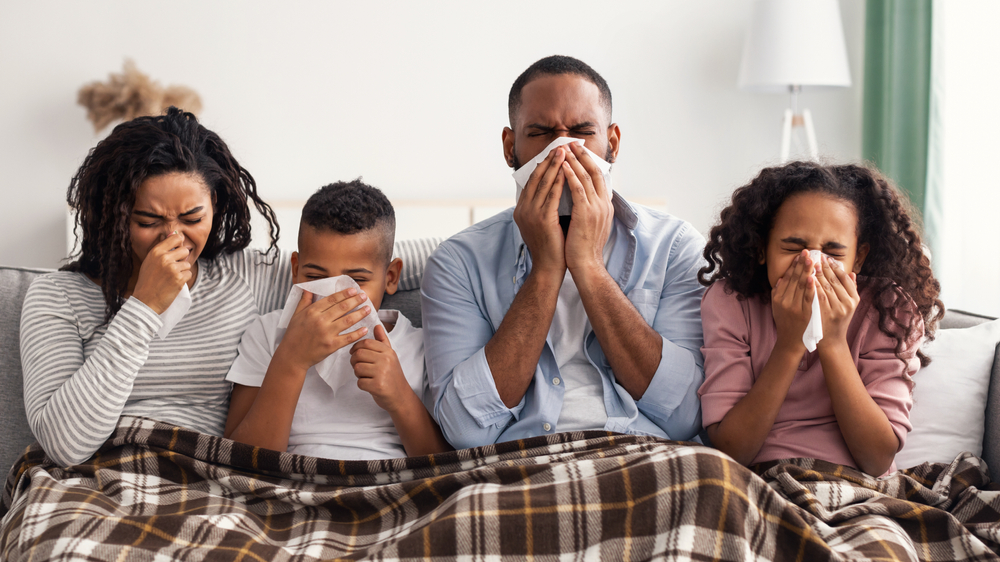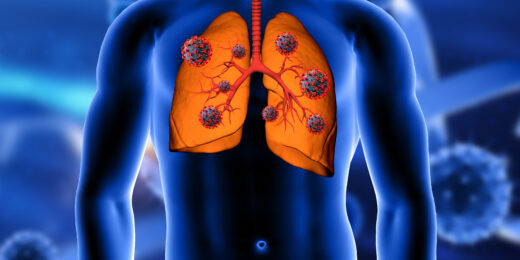It crept up slowly, almost imperceptibly. A vague rawness at the back of my throat. A thrumming malaise. On Thanksgiving Day, it lunged.
For two weeks, I was in the grip of an unusually malevolent respiratory illness. But I was in good company: Nationwide, the percentage of health care visits for flulike symptoms ticked up above the baseline at the start of November and has remained elevated ever since, according to the Centers for Disease Control and Prevention.
"All the respiratory viruses are back in full force," Anne Liu, MD, a Stanford Medicine immunologist and infectious disease specialist confirmed. The main reasons, she said, are fairly straightforward: Social distancing and masking are not popular choices in the wake of the pandemic.
Abraar Karan, MD, another infectious disease expert at Stanford Medicine, has been struck by how few people he sees wearing masks in crowded places. "This was most clear when I was recently at the airport," he said.

Still, this season of heightened respiratory illnesses -- while annoying and extra snotty for many -- doesn't appear to be headed for disaster, Karan said. "Thus far, it doesn't seem we're on course for a significantly worse flu season than ones we have seen in the past decade -- and our COVID-19 season is definitely less severe than the past two years," he said.
Indeed, the CDC recently reported that the number of patients seen at outpatient clinics each week for a fever plus a cough or sore throat was trending downward. Weekly hospitalization rates for confirmed cases of respiratory syncytial virus (RSV), flu and COVID-19 have also ticked down since the start of the new year.
This may be cold comfort to readers shivering with a fever beneath a mountain of blankets. So, I consulted with Liu and Karan about what to expect over the next few months as we move deeper into cold and flu season. What can we do to prevent infection from the big three -- influenza, COVID-19 and RSV? And if we catch one of them, how can we manage being sick?
What's making people sick
The CDC reports that between Sept. 30 and Jan.13, an average of 4.7% visits to the emergency department have been related to respiratory illness. That's down from 6.3% over roughly the same period a year ago -- though still comparatively high in terms of the past decade. There's more good news: The number of confirmed deaths from the flu over the last 10 weeks of 2023 was down significantly compared with the same period in 2022, from about 6,000 to 1,600.
And while COVID-19 continues to be the most lethal respiratory virus nationwide -- it killed nearly 22,000 people between Sept. 30 and Jan. 13, according to the CDC -- that's only about half the number of deaths it caused during roughly the same period a year ago. Hospitalizations for infection with the virus are also down, even though U.S. wastewater levels of the coronavirus are higher than they were a year ago at this time.
Karan attributes this discrepancy to the fact that many people have gained more immunity to the disease from vaccinations and past infections. "The most recent strain, JN.1, is likely more able to evade the immune system, but it is not as of yet confirmed to be more virulent," he said. "So we are seeing a lot of reinfections, but they don't necessarily lead to hospitalizations."
I asked him whether the severity of other respiratory infections could be worse this season, citing my experience at the start of the holidays (the cause of which wasn't the coronavirus).
"Based on death data from last year compared with this year, I would not say that our usual respiratory viruses are behaving in a more pathogenic way," he said. "However, there have been many hypotheses -- unproven -- that because we had more masking and social distancing in the past seasons, our immune systems have a 'debt' to pay. This hasn't really been proven at a population level."
Based on death data from last year compared with this year, I would not say that our usual respiratory viruses are behaving in a more pathogenic way
Abraar Karan
In addition, hospitalizations for RSV were down from October through December compared with the same period in 2022, the CDC reports, and the rate continues to drop in the new year. RSV, which can cause cold or flulike symptoms, has hit young and old people particularly hard over the past two years, although it's been responsible for far fewer hospitalizations than the flu and COVID-19.
How not to get sick
Both Liu and Karan stressed the effectiveness of vaccines to prevent severe illness from any of the big three -- and that it's not too late in the season to get them.

"COVID vaccinations and boosters, as well as flu vaccinations, should still be on everyone's checklist," Liu said. These vaccines provide modest protection against infection from the viruses but are extremely effective at reducing the severity of the diseases they can cause, she added.
In 2023, the Food and Drug Administration approved vaccines against RSV for pregnant women and older adults. An option for babies and some toddlers are monoclonal antibodies, which don't activate the immune system the way a prior infection or vaccination does but can offer short-term protection against the disease.
"The monoclonal antibodies are targeted at very young children with high-risk conditions because there's just not enough of it for all infants," Liu said.
The physicians also recommended the following preventive measures against all three viruses: wearing a mask around people indoors (especially a N95, KN95 or KF94 mask); washing your hands frequently; not touching your mouth, nose and eyes; and ensuring good ventilation in indoor spaces. Installing high-efficiency air filters in building ventilation can also help, they said.
Both Karan and Liu expressed skepticism about the utility of taking dietary supplements, such as Vitamin C and zinc, to prevent illness or combat infection. "It is possible that vitamins and other important nutrients could help bolster the immune system, but we don't have strong data to suggest that there is a causal relationship in terms of their effects on pathogen defense," Karan said.
But Liu said some studies suggest that regular exercise and adequate sleep could benefit immune function.
So, now you're sick
If you've come down with a viral respiratory illness, it's wise to determine whether you're infected with the coronavirus by first taking an at-home test, Liu and Karan said. If your test comes back negative the first time, take another one in 48 hours. (Testing kits are available free of charge from COVID.gov.) You can also visit your health care provider for a flu test.
COVID vaccinations and boosters, as well as flu vaccinations, should still be on everyone's checklist.
Anne Liu
Among those with the flu, pregnant women, women who recently gave birth, children younger than 2, adults 65 and older and anyone with an existing medical condition -- such as a weakened immune system, asthma, diabetes, obesity or heart disease -- should consult with a doctor about possibly taking an antiviral drug, the doctors said.
For COVID-19, adults 50 and older, as well as people of any age with health conditions such as obesity, diabetes, asthma, heart disease or a weakened immune system, are likely to benefit most from an antiviral drug, they said. Pregnant women and young, unvaccinated children are also good candidates, especially if their illnesses are at risk of becoming severe, they said.
For RSV, there aren't expressly tailored outpatient treatments; inpatient treatments are used selectively for high-risk populations, Liu said.
Severe COVID-19, flu and RSV symptoms, such as a fever lasting more than three days, dizziness or shortness of breath, are red flags that it's time to seek professional medical care, the physicians said.
But for mild or moderate cases, they said, some venerable advice still applies: Drink plenty of fluids and get plenty of rest. Acetaminophen and ibuprofen, both over-the-counter drugs, can help manage pain and reduce fever. Pseudoephedrine, another over-the-counter drug, can help reduce congestion, but it also acts as a stimulant, so it should be taken at least a couple of hours before bed, the doctors said. It's not generally recommended for children younger than 6.
For children older than 1, a little bit of honey can help reduce coughing, they said.
Lastly, to avoid spreading your germs to others, the physicians recommended wearing a mask in public and at home, if you live with other people; washing your hands frequently; coughing and sneezing into your arm; and, when possible, steering clear of crowds and places that can get crowded, such as grocery stores and restaurants.
Image: Prostock-studio






